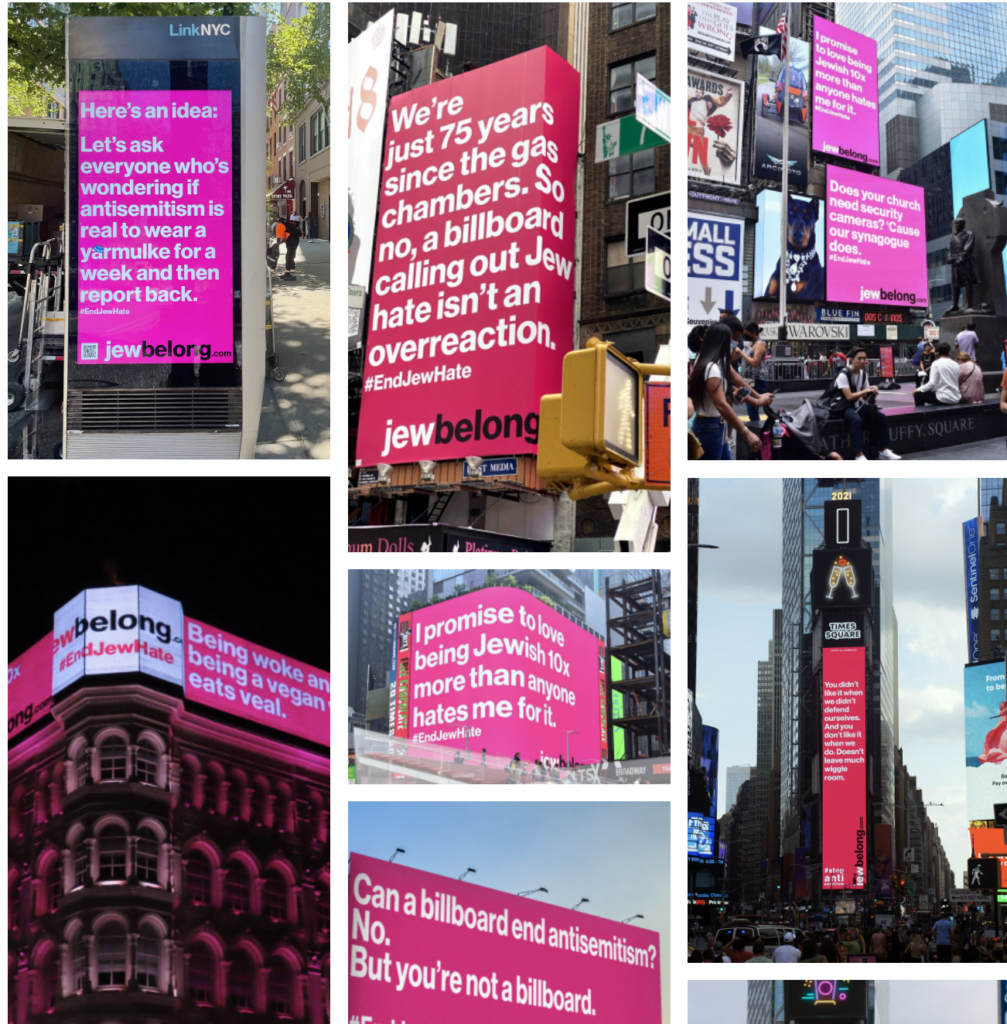Robert Kraft will spend $25 million running ads against antisemitism. Is this the right way to protect Jews?
The advertisements will focus on wrenching scenes of antisemitism, and highlight bystanders who intervene, but critics aren’t sure the campaign will work

Robert Kraft, the Jewish billionaire and owner of the New England Patriots, plans to spend at least $25 million to run advertisements raising awareness about antisemitism. Photo by Getty Images
In what may be the most ambitious public awareness campaign about American antisemitism since the 1950s, Robert Kraft, the billionaire Jewish businessman, plans to spend $25 million flooding television airwaves with wrenching depictions of hatred against Jews over the next six weeks.
The effort, launching Monday, will aim to show the advertisements to every American adult at least ten times — for a total of more than one billion impressions — and ask them to post a blue square emoji on social media to draw attention to antisemitism.
“We believe this is the most effective way to start a conversation with people across the country,” said Matthew Berger, the director of the Foundation to Combat Anti-Semitism, which is managing the project. “We need to show people outside the Jewish community what antisemitism looks like.”
The move by Kraft, who created the foundation in 2019, is the newest and most expensive entry in a growing field of advertisements condemning antisemitism aimed at the general public. While a host of philanthropists appear eager to bankroll these appeals, some observers question the efficacy of pouring millions of dollars into public campaigns whose impact is difficult to measure.
“We don’t have people who are asking, ‘Hey, is this a good strategy?’” said Jonathan Sarna, a scholar of American Jewish history.
Critics question whether portraying Jews as a uniquely embattled minority group is accurate or productive. The campaign leans heavily on an interpretation of polling data and statistics that makes hatred against Jews appear especially dire.
Kraft first ran an advertisement against antisemitism last fall during an NFL game featuring the New England Patriots, which he owns. But JewBelong has been running billboard campaigns against antisemitism since 2021 and Shine A Light, a coalition of nearly 100 leading Jewish groups funded by the South African billionaire Natie Kirsh, ran a national advertising campaign about antisemitism over Hanukkah.
There have been other smaller and more sporadic projects, including ten digital billboards produced by the Jewish Federation of Greater Los Angeles in December meant to highlight pithy words of Jewish wisdom. And that’s not counting the proliferation of social media awareness campaigns — which require far fewer resources to produce — by organizations launched in recent years like #EndJewHatred.
Kraft created FCAS, which is based in the Boston area, after he won the Israeli Genesis Prize, pledging $20 million to the new foundation and announcing two $5 million gifts from others, including Roman Abramovich, the Russian Jewish billionaire who has recently been ensnared by controversy over the war in Ukraine.

At the time, Kraft said one of his primary motivations was “to counter the normalization of antisemitic narratives that question Israel’s right to exist,” though he stayed away from that rhetoric in announcing the new media blitz.
Instead, the focus is on what many metrics have shown to be a rising number of antisemitic incidents in the country. “There is a role for each of us to play in combating a problem that is unfortunately all too prevalent in communities across the country today,” Kraft, who declined an interview request, said in a statement. “We must stand up and take action against the rise of all hate.”
This rise includes antisemitic stunts, like banner drops and laser projections by white supremacist groups, as well as the offensive acts by celebrities, media figures and politicians like Donald Trump, who dined with Nick Fuentes, a Holocaust denier, in November.
Kraft has long been close with the former president, including donating $1 million to Trump’s inaugural committee, and his new ad push steers clear of political components of antisemitism.
Highlighting ‘upstanders’
The minute-long ads, directed by Derek Cianfrance, who made the film Blue Valentine, feature harrowing depictions of antisemitism followed by moving interventions from people outside the Jewish community. In one, a young girl is confused to see the message “No Jews” painted alongside a swastika on her family’s garage door. When her mother returns from dropping her off at school, a neighbor has painted over the graffiti. “1 in 4 Jewish Americans were the victim of hate last year,” the ad concludes.
That figure comes from an American Jewish Committee survey released in February, and refers to the 26% of Jews who reported being targeted by an offensive remark in person or online, or a physical attack. Respondents were not polled about antisemitic vandalism like that depicted in the video, which is exceedingly rare. The Anti-Defamation League found that vandalism targeting homes represented a tiny fraction of overall cases last year: about 12 out of more than 3,600 incidents.
In another spot, a teenage boy is sitting on his bed when he starts receiving antisemitic comments on a TikTok video of his bar mitzvah. “Could your Jew nose get any bigger???” one reads. Moments later, a Black a capella group sends him a video in which they sing a Jewish prayer. Another statistic flashes on the screen: “70% of Jewish Americans faced antisemitism online last year.”
The AJC found that 13% of American Jews had been “the target” of online antisemitism, like the boy in the ad. That number jumps to 69% after including those who had seen antisemitic content online that was not directed at them at least once in the past year.
Berger said the scenes depicted in the ads were based on real incidents and that they represented a fair portrayal of antisemitism.
“Not all antisemitic incidents are to the level of what we describe in our videos, but I believe everyone in the Jewish community is fearful that they’re the next target,” Berger said in an interview.
The campaign, called #StandUpToJewishHate, is focused on the idea that Jews are a tiny proportion of Americans but the targets of most religious hate crimes. The blue square emoji, which takes up a small share of television and phone screens, is meant to represent the 2.4% of Americans who are Jews.
The square is contrasted with the 55% of religious hate crimes that the FBI said were aimed at Jews in 2020, the last year for which reliable data is available. Like other figures used in the campaign, that statistic is also complicated. There were 959 hate crimes against Jews reported in 2020, or about 8% of all such incidents if you include hate crimes of all categories. FCAS shows both the 55% and 8% figure on its website.
The emphasis on rising antisemitism, and the need for non-Jews to intervene, is a common theme in recent public campaigns about the issue. Shine A Light, which was launched in 2021 but expanded with a $4 million budget last year, used the hate crime statistics in social media ads, while JewBelong directs many of its arch appeals to the general public: “Does your church need security cameras? ’Cause our synagogue does.”
But do they work?
Jewish ad campaigns against discrimination became popular in the 1930s and many ran through the 1950s, using a combination of billboards, bumper stickers, pamphlets and radio messages to promote an inclusive society.
These public appeals, which did not focus on antisemitism, were funded by the ADL and American Jewish Committee, though they eventually fell out of favor in the 1960s as the sponsors realized they had no idea if the ads were working.
“It was virtually impossible to demonstrate to financial contributors in the Jewish community, for example, that costly mass media programs were having a significant impact on public opinion,” Stuart Svonkin, a scholar of antisemitism, wrote in his book Jews Against Prejudice.
There have been sporadic attempts to run ads decrying antisemitism and raising Holocaust awareness in the decades since, although they did not become common in the U.S. until recently.
In 2004, the Union of Jewish Students in France canceled a series of ads condemning antisemitism that portrayed the French phrase for “Dirty Jew” above images of Jesus and Mary, a pairing that managed to offend both Catholics and many Jews.
And in 2001, two ad campaigns were canceled for doing more harm than good. A billboard in Berlin meant to raise money for a Holocaust memorial showed a pristine mountain landscape under the words “The Holocaust Never Happened,” intended to offer a jarring example of what forgetting the genocide might look like. It was taken down early. That same year in the Czech Republic, a series of government-sponsored television ads, billboards and transit posters meant to ridicule neo-Nazis alarmed many locals by using the confusing slogan, “Be Kind to Your Local Nazi.”
Sarna, a professor at Brandeis University, said it wasn’t just the effectiveness of advertising against antisemitism that has gone untested. Almost none of the recent boom in philanthropy focused on keeping Jews safe has been rigorously analyzed.
“Our tendency is to think — and it’s not wrong — that every piece helps,” said Sarna, who complimented Kraft for finding a niche in a crowded field. “But it seems that evaluation could tell us much more about what’s effective, what works, what doesn’t work.”

‘Universal values’
Sharon Goldtzvik, a communications consultant who works with Jewish groups, said that the support of a single donor like Kraft, who is worth an estimated $7.2 billion, may have enabled a campaign that is divorced from a larger strategy.
“You can do something that has really, really significant penetration and you don’t have to first do a lot of deep narrative thinking and work,” said Goldtzvik, who designed a recent guide on how progressives can talk about antisemitism in a productive manner for Bend the Arc and the Collaborative for Jewish Organizing, a network of nine liberal groups.
Goldtzvik said the scenes in the FCAS ads were moving and would likely resonate with many Jews. But she said they also risked portraying Jews in competition with other minority groups — for example, when it comes to who is the victim of more hate crimes — and make Jews who see the ads feel isolated.
“When you portray it in that way, I think it could have the effect of just making Jewish people feel more afraid,” she said.
Berger said the ads, with a focus on people outside the Jewish community intervening to correct antisemitism, are meant to encourage the opposite.
“We’re highlighting a problem that is very specific — and how prevalent it is today — but also, at the same time, reinforcing values that are universal,” he said. “The same values we would expect people to respond with if they were addressing racism, gender inequality, LGBTQ hate.”
The #StandUpToJewishHate campaign will be backed by a coalition of more than 100 organizations, including many outside the Jewish community like AARP, the League of Women Voters, National Urban League and the National Governors Association.
After an initial six-week push, Berger said the goal is to target similar videos and ads to specific populations. For example, they could target messages on social media to users who follow a celebrity that has made offensive comments, or toward residents of a city where an antisemitic incident took place.
The campaign by FCAS, which has a staff of 10 and has mostly focused on tracking online antisemitism, also includes a notable break with much of the recent advocacy around antisemitism by leading Jewish organizations: it doesn’t mention Israel.
Both Shine A Light and JewBelong, backed by most national Jewish organizations, have condemned anti-Zionism as a form of antisemitism and made aggressive defenses of Israel a central part of their work.
But Berger said Kraft’s new campaign will not mention Israel or Zionism.
“Our approach is really focusing on what antisemitism looks like to the American Jewish community and how it impacts them,” he said. “We’re not really focused as much on what precedes it or what causes people to engage that way.”















